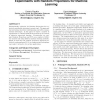Free Online Productivity Tools
i2Speak
i2Symbol
i2OCR
iTex2Img
iWeb2Print
iWeb2Shot
i2Type
iPdf2Split
iPdf2Merge
i2Bopomofo
i2Arabic
i2Style
i2Image
i2PDF
iLatex2Rtf
Sci2ools
102
click to vote
KDD
2003
ACM
2003
ACM
Experiments with random projections for machine learning
Dimensionality reduction via Random Projections has attracted considerable attention in recent years. The approach has interesting theoretical underpinnings and offers computational advantages. In this paper we report a number of experiments to evaluate Random Projections in the context of inductive supervised learning. In particular, we compare Random Projections and PCA on a number of different datasets and using different machine learning methods. While we find that the random projection approach predictively underperforms PCA, its computational advantages may make it attractive for certain applications. Categories and Subject Descriptors G.3 [Probability and Statistics]: Probabilistic algorithms; I.5.m [Pattern Recognition]: Miscellaneous General Terms Experimentation, Performance Keywords random projection, dimensionality reduction
Data Mining | KDD 2003 | Keywords Random Projection | Random Projection Approach | Random Projections |
Related Content
| Added | 30 Nov 2009 |
| Updated | 30 Nov 2009 |
| Type | Conference |
| Year | 2003 |
| Where | KDD |
| Authors | Dmitriy Fradkin, David Madigan |
Comments (0)

